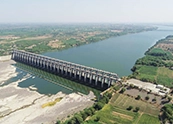4.1 Environmental Impact: Nurturing a Sustainable Future
Bordered by the fragile young Himalayas and a long coastline, India’s vast and varied geography is particularly vulnerable to climate change.
Climate change has a widespread impact, influencing nearly every individual and region globally. However, its effects are particularly pronounced in rural marginalised communities that depend significantly on agriculture and fishing for their livelihoods. These communities encounter various challenges, including the risks associated with climate variability. NABARD's Wadi approach stands out as an excellent model of sustainable forest management. It not only offers sustainable livelihood opportunities to tribal families but also fosters environmental sustainability. At the same time, NABARD's watershed development programme plays a crucial role in delivering essential environmental resources. This initiative empowers communities affected by climate shocks, enhancing their resilience, and enabling them to adapt more effectively. Also, NABARD serves as the National Implementing Entity for the Adaptation Fund under the United Nations Framework Convention on Climate Change (UNFCCC) and the National Adaptation Fund for Climate Change, as well as the Direct Access Entity for the Green Climate Fund under the UNFCCC. Through these initiatives, NABARD directs financial resources towards climate change adaptation and mitigation, offering crucial assistance to the communities that are most at risk. By concentrating on the dual aspects of livelihood improvement and ecological preservation, NABARD is fostering a more sustainable and resilient future for communities in vulnerable situations.




